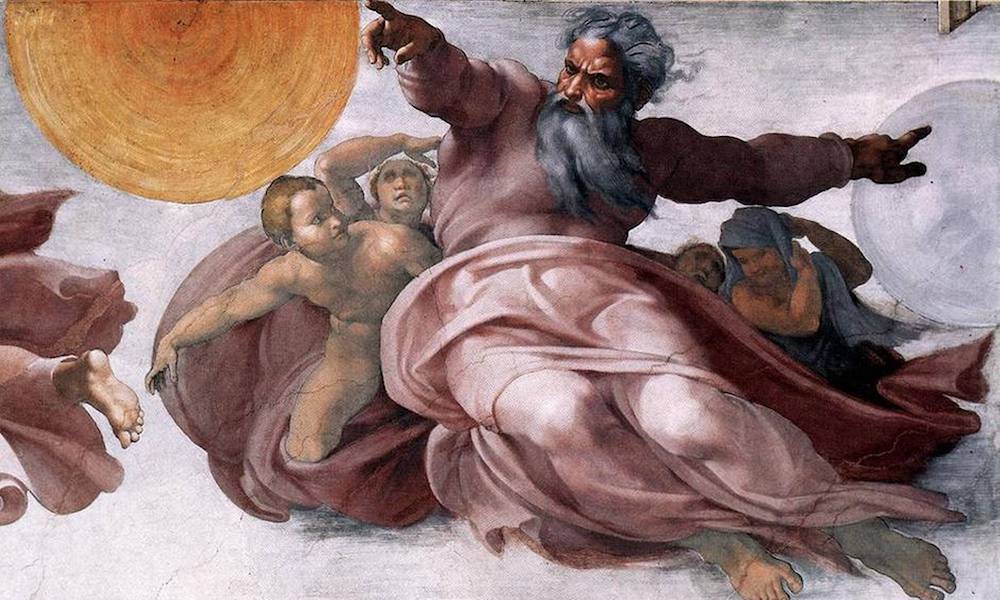I recently posted a Facebook ad promoting my Grace I Seek Journal and set it to target Christians. It surprised me to see a flood of comments on the post from atheists who were rather anti-Christian. One of them posted this image:

I realised that someone took the time to put together this graphic. I can’t blame that person if this is the only way they know God. This is the tragedy of the brand of Christianity that’s not only put forth in the media, but it’s an understanding of God that has been maintained, by some, through the centuries. As far as I’m concerned, the person who made this list is right. This God does not exist.
 A Bad Image of God
A Bad Image of God
This represents a larger problem with our image of God and our understanding of God’s revelation. There are believers and non-believers alike who believe in the kind of God who causes suffering, favours one group over another, and exists to grant wishes. This is a Zeus-like god. Believers who have this image of God live a fear-based faith and would rather go through the motions of religious practice and prayer in order to avoid God’s wrath. They may go to church but they really don’t know Jesus, and they may even take all of scripture literally (including the Creation story and the Noah story). Atheists who have this understanding of God are atheist because they see it as an unhealthy image. The rub is that we have shown them no other kind of God. Not that atheists are bad people. Indeed, there’s an atheism that rejects the notion of God after extensive research, education, and thoughtful conversation with others. I respect that, actually. They’ve used their free will and conscience to make an informed belief choice. But there’s another kind atheism that all together rejects Christianity based on the particular brand of Christianity that appears as bigoted and exclusive. It ignores the myriad of images of God and spiritualities within the larger tradition. It’s a kind of Christianity that may be called “fundamentalist” and focuses almost exclusively on getting to heaven and avoiding hell – i.e. a fear-based religion. It is not about an intimate relationship with a loving God, because that’s not its image of God. This kind of Christianity is what some atheists think it’s all about. But when we reduce the focus of Christianity to the afterlife, and whether we’re going to get there, we reduce faith to something that is provable or not provable. And you’re not going to get very far with that kind of dualism.
A Shallow Christianity
One Facebook commenter wrote, “The sooner we get together and help each other instead of praying to imaginary beings the better off we will be.” Ironically, this statement is the opposite of what Ignatian spirituality promotes. Ignatius would tell us that our relationship to God is a response to an experience of love, and that, most definitely, moves us beyond ourselves to help and care for the other. I agree that Christians whose prayer is just to placate an angry God or for their own salvation, who never come out of their prayer closets or churches, are likely not helping others. But Christianity, at its heart, is truly catholic – universal – which expresses an inclusive love, unearthed in community, through prayer.
Another commenter wrote, in response to my journal ad, “Now you can actually document having an imaginary friend on Sundays.” Maybe this is another element of how popular Christianity is viewed: that God is just about Sundays and church. Ignatius promoted the idea of a friendship with a personal God that goes far beyond Sundays! It’s a friendship that’s deeply personal, intimate, vulnerable, and loving. And rather than a God who hides (as in number 8 on the list), Christianity presents a God who can be accessed any time and in many, many ways. If I have a God who is simply tallying my sins, waiting to see me make a mistake so to send me to hell — and only sees me on Sundays — well then I don’t want to be a part of it either.
But the Christian Tradition is far deeper than the institutions we see today and a literalist interpretation of scripture. In his book, The Big Book of Christian Mysticism, Carl McColman points out that the Protestant Reformation caused Catholics to beat the drum about obedience to the Church, and Protestants emphasised obedience to the Bible. Christianity shifted from being about an encounter with God to a religion about obedience and moral behaviour. Monarchical images of God strengthened, and thus the image of God as portrayed in “God’s To-Do List” above began to stick. We see the Church as a ticket to heaven and we see the Bible, not as an account of humanity’s trying to make sense of and relate to God, but an unerring verbatim instruction from God requiring little need for prayer and interpretation. This is one reason people see religion as irrelevant.
Theologian Brian McLaren noted recently in Richard Rohr’s daily email that he sees the future of Christianity as:
decentralized and diverse rather than centralized and uniform. In other words, it will have the shape of a movement rather than an institution. It will be drawn together . . . by internal unity of way of life, mission, practices, and vision for the common good.
This was Jesus’ approach, he reminds us. If we truly looked into the eyes of the Jesus as presented in the gospels, we would not see the kind of God so many reject. We would see a way of life that leads to freedom and communion with one another. We would see love.
Which images of God do you reject? Which do you hold dear?
Related posts:
Listen to the podcast version of this post…









I really like this post. You get to the heart of the matter. To paraphrase an old hymn, “you know nothing until you know God’s love.”
God is love, and those who abide in love abide in God, and God abides in them.
– 1 John 4:16
Beautiful, thoughtful, relevant and inclusive!! Great article.
the bible presents a god that picks and chooses which humans can accept it and which can’t. Then it damns those who it prevents to be able to accept it to eternal torture (Romans 9).
that god is nothing more than an invention by humans who don’t like the fact that other humans disagree with them and sadistically want them to be hurt. That many Christians want to invent a new kind of god rather than the one in their bible is nothing new. Christians invent their god in their image, and a humane Christian’s god will be humane and an inhumane Christians god will be inhumane.
This is a great springboard for discussion and future articles, Andy. It is what I experience with my family and friends who reject the Church. Many don’t have a personal experience with being cherished while they and others also look at the cruelty in word and action in the name of God that surrounds us. Some of us may not have experienced being loved without conditions but managed to find the friendship that Ignatius introduced. Personally, It is the only thing that allows me to hang on in the face of narrow minded, fundamentalist, joyless liturgies.
There is so much talk of evangelization…if we applied Maslow’s Hierarchy of Needs to those we know, love, meet, they need us to be what we believe…just be…kind, patient, accepting, supportive. That might not cause a great transformation but it will create a moment of confusion that has led one friend to argue against any organized religion but accepts with curiosity how I can remain Catholic in the midst of my own frustration and disappointment. Pope Francis does it every day and he draws them to him. They smile when they mention or hear his name.
Platitudes and quotes from scripture don’t mean anything if people can’t internalize the words. I took faith for granted until I almost lost it and lived in the almost Dark for more than a decade. It has helped me understand the anger in the comments that you mention and are showing up here.
I’m grateful for your writings. They have been light in the darkness.
Thank you for this amazing and insightful article. Not seeing God at work in the earnest search of another person for faith and meaning (including the searches of “atheists” and “fundamentalists”) seems to disregard a foundational principle of Christianity: everyone who seeks, will find. (Luke 11:10)
That’s a lovely little homily, but the very existence of so many Atheists proves it wrong. Many ‘Good Christians’ sought, and many of those were priests, preachers, ministers, and seminary students before theydid not find…. and became Atheists. Can you accept this, or do you wish to apply the “No True Scotsman” argument?? 😕
@Archon: No true Scotsman knows when the spiritual journey “ends.” 🤓
“@Archon: No true Scotsman knows when the spiritual journey “ends.” 🤓”
that’s just kicking the can down the road in vain hope that people will agree with you.